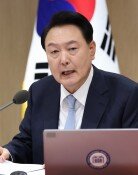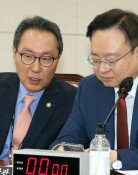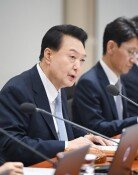Moon, Abe agree on ‘extreme’ sanctions against N. Korea
Moon, Abe agree on ‘extreme’ sanctions against N. Korea
Posted August. 31, 2017 08:12,
Updated August. 31, 2017 08:41
South Korean President Moon Jae-in and Japanese Prime Minister Shinzo Abe agreed on Wednesday to further increase pressure on North Korea to an "extreme" level to make the communist state to come to the negotiating table. They reached the agreement during a telephone conversation immediately after the United Nations Security Council (UNSC) was convened unusually swiftly to unanimously adopt a statement denouncing Pyongyang’s missile launch on the previous day.
It was unusual for President Moon, who had called for both sanctions and dialogue, to send such a strong message to the North, probably indicating his disappointment over Pyongyang’s repeated provocations. Even during the tough war of words between Pyongyang and Washington following the North’s series of firing of intercontinental ballistic missiles, the South Korean president opposed a war on the Korean Peninsula. Although the abated war of nerves between Pyongyang and Washington sparked hopes of a shift to dialogue, President Moon seems to have concluded that he could not tolerate the North’s launch of a ballistic missile that flew over Japan.
The "extreme" sanctions agreed on by the South Korean and Japanese leaders also target China, of course. An official at Seoul’s presidential office Cheong Wa Dae said that attention is drawn to whether a halt to oil supply and an oil embargo will be included in the implementation of the latest UNSC sanctions resolution. The UNSC meeting also reportedly discussed what kind of sanction measures are left available for the North. After all, the most effect and painful measure would be to shut China’s oil pipeline to North Korea.
What attracted attention was U.S. President Donald Trump’s reaction. "Threatening and destabilizing actions only increase the North Korean regime's isolation in the region and among all nations of the world. All options are on the table," he said in a statement. The message was unusually restrained, compared with his previously tough rhetoric such as "fire and fury" and "(military options) locked and loaded," apparently testing his patience against the North for the last time.
Nevertheless, North Korea waged a large-scale propaganda campaign celebrating the "successful" missile provocation. North Korean leader Kim Jong Un showed arrogance, saying the latest firing was "the first step of the military operation of the Korean People's Army in the Pacific and a meaningful prelude to containing Guam." He also said that Pyongyang will "continue to watch the U.S. demeanors as already declared and decide its future action." While the remarks indicates his intention to change the speed of provocation to see how Washington responds, it is questionable whether he is reading the situation properly.
Now, both Washington and Seoul are running out of patience over Pyongyang’s provocations. Beijing is implementing sanctions step by step under the recent UNSC resolution. It also voted in favor of the latest statement condemning the North. Liu Jieyi, China's ambassador to the United Nations, took a wait-and-see attitude over additional sanctions on North Korea. China should not balk any longer. It is approaching a critical point where the North’s provocations can no longer be left untouched. This time, Beijing should shut the oil pipelines to the North to bring Pyongyang to the negotiating table.
klimt@donga.com
Headline News
- Israel prepares for retaliation against Iran
- Samsung reclaims top spot, surpassing Apple in smartphone market
- 77% of Koreans in 20s and 30s are 'Kangaroo Tribe' due to job crisis
- KBO referees embroiled in controversy over ABS decision concealment
- Inflation, oil price surge put double shock on global economy







